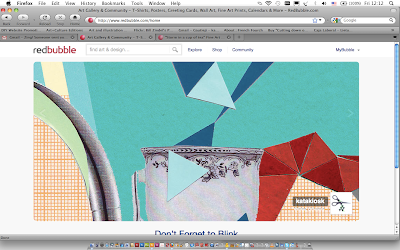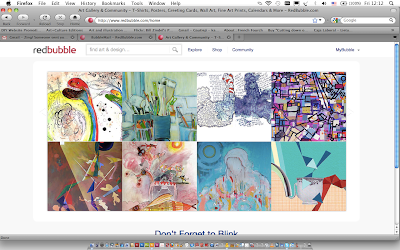Old promises kept. Finally found some time to split my undergraduate dissertation on Kitsch into series of 'articles'. The paper was written during my final year at Kingston University, Illustration and Animation BA. The thesis is Kitsch being a gatekeeper of ideology in both - communist and capitalist countries. In the Introduction below you can find main terms defined and main goals of the essay set. Feel free to quote but use a proper reference of 'Kotryna Zukauskaite, undergraduate dissertation 'KITSCH: GATEKEEPER OF IDEOLOGY', Kingston University, 2010' with a link to this post.
-----------------------------------------------------------------------------------------
KITSCH: GATEKEEPER OF IDEOLOGY, article series, #1.
-----------------------------------------------------------------------------------------
None of us is superman enough to escape
kitsch completely. No matter how we scorn it,
kitsch is an integral part of the human condition. (1)
INTRODUCTION
Before arguing the main thesis of kitsch being a gatekeeper of ideological beliefs, I think it is very important to define the key-terms of this paper, as well as to narrow down the subject to very particular historical contexts in terms of political, social and economical systems that impacted on the cultural development of the masses in different regions of the world that will be defined more particularly in further pages of this paper.
Firstly it is essential to point out that this essay does not focus on Camp - ironical, “conscious kitsch” that ‘sees everything in quotation marks. It’s not a lamp, but a “lamp”; not a woman, but a “woman” ‘
(2) . It could even be said that Camp is opposite to what the term Kitsch means in this paper because, Camp, by being a form of art, is targeted into a spectator and ones introvert emotions, and Kitsch, as I will discus later in this dissertation, is an extrovert experience, because, as Devrğm Kaya has accurately pointed out, ‘kitsch has its real being when it meets with the mass’
(3) .
Secondly, this essay is based on idea of Kitsch being more than an aesthetic term. It is a social phenomena, ‘product of the industrial revolution which urbanized the masses ... [That lost] their taste for folk culture whose background was the countryside’
(4) and this definition broadens the meaning of kitsch with ethical, psychological and even political layers because ‘every ceremony, every ritual, every public display can be kitsched’
(5) . This approach towards Kitsch gives an opportunity to analyze the depths of Kitsch, its role in leading masses to ideological or even utopian dreams, such as:
- The totalitarian utopia of ‘bright future of Socialism’ in former Soviet Union beginning with cult of Stalin during The Second World War and ending with collapse of Soviet Union in 1990 as well as the last ruins of Communist Utopia in some of still totalitarian Communist countries (such as North Korea, Belarus, Turkmenistan) lasting till today.
- ‘Western’ capitalistic ideology (most often directly related with democratic political system), based on free market ideals and mass (over-) production where freedom of choice is often replaced by ‘constant stimulation of individual dreams and desires’ (6) , overconsumption and greed of corporate players such as mass media (advertising especially) or even politicians who want to be (re-) elected.
It also should be pointed out that there were more totalitarian regimes that used kitsch as the official style (such as Nazi regime in Germany for example) or other ideologies (such as religious ideologies) that could be related with kitsch and these subjects could be a further development of this paper, but this dissertation focuses particularly on Totalitarian Communist kitsch and Western tradition of Capitalism (as two ideologically opposite doctrines that developed in parallel in the 20th century) in order to show that Kitsch acts the same role in any ideology.
Finally, the aim of this dissertation is to take a new angle of research on Kitsch by taking the famous quote of one of the key-writers on Kitsch, Clement Greenberg, - ‘Kitsch changes according to style, but remains always the same’
(7) - and expanding it to ‘Kitsch changes according to ideology, but remains always the same’ by showing Kitsch’s role in affecting and even forming lifestyles of masses in different and even contrasting ideological contexts.
-----------------------------------------------------------------------------------------
1 Kundera, M. (1984) The Unbearable Lightness of Being. New York, Harper and Row, pp. 256
2 Sontag, S. (1964) Notes on “Camp”. Partisan Review, 31(4) 515-530 [Online].
Available at http://www9.georgetown.edu/faculty/irvinem/theory/Sontag-NotesOnCamp-1964.html
3 Kaya, Devrğm (2004) A Research On The Possibility Of Distinguishing Kitsch And Art Using Philosophical Hermeneutics. M.A. dissertation, Middle East Technical University Ankara pp.66 [Online]. Available in full at http://etd.lib.metu.edu.tr/upload/12605433/index.pdf
4 Greenberg, Cl. (1939) Avant-Garde And Kitsch. Partisan Review, 6(5) 34-39 [Online].
Available at < http://www.sharecom.ca/greenberg/kitsch.htm
5 Scruton, R. (1999) Kitsch and the Modern Predicament. New York: City Journal, 9(1) 94-95 [Online]. Available at < http://www.city-journal.org/html/9_1_urbanities_kitsch_and_the.html
6 Jacobsen, M.H. and Poder, P (eds.) (2008) The sociology of Zygmunt Bauman: challenges and critique. Surrey, Asgate Publishing Group pp. 221
7 Greenberg, Cl. (1939) Avant-Garde And Kitsch. Partisan Review, 6(5) 34-39 [Online].
Available at < http://www.sharecom.ca/greenberg/kitsch.html





















